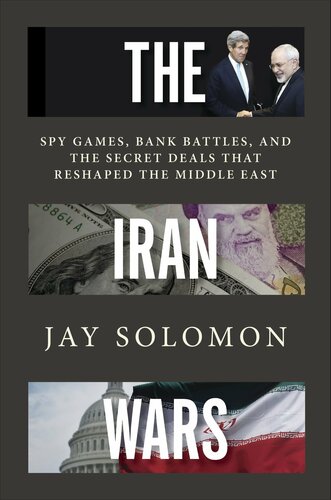
The Iran Wars
Spy Games, Bank Battles, and the Secret Deals That Reshaped the Middle East
کتاب های مرتبط
- اطلاعات
- نقد و بررسی
- دیدگاه کاربران
نقد و بررسی

August 22, 2016
Solomon, the Wall Street Journal’s chief foreign affairs correspondent, offers a timely, challenging account of the sanctions and secret negotiations that led to the July 2015 nuclear accord between Iran and the UN. Candid interviews with major figures such as U.S. Secretary of State John Kerry and Syrian leader Bashir al-Assad add to Solomon’s rich analysis. For over a decade, the Bush and Obama administrations struggled with little success to contain Iran’s ambitions in the Middle East and access to nuclear power. To achieve its goals, the U.S. cut deals with Russia and China and damaged relations with allies Israel and Saudi Arabia. Solomon remains skeptical that détente with Iran is the right solution. What he calls Obama’s defining achievement in foreign policy is also, by his lights, “among the riskiest bets made by a U.S. president in modern history.” As terms of the agreement lapse during the coming decade, he believes that the likelihood of a catastrophic Middle East arms race will grow. Iranian intransigence remains strong, and the country is using regional instability, notably in Syria, to undermine America’s interests. Solomon’s dense, informed behind-the-scenes report will gratify readers with deep interest in Mideast affairs. Casual readers, however, will find the story line too daunting to benefit from Solomon’s insights.

A thorough yet concise survey of Iran's buildup of nuclear technology since the 1980s, its troubling exporting of Shiite insurgency in countries around it, and the changing American reaction.Wall Street Journal chief foreign affairs correspondent Solomon offers an evenhanded look at the backdoor schemes involving the building of Iran's nuclear weapons and the world players involved in and against its machinations. The culmination of a nuclear treaty between Iran and the U.S. by Secretary of State John Kerry and team in July 2015 (and the lifting of sanctions against Iran) proves anticlimactic as a drastic change of course since the George W. Bush administration--as Solomon notes, he is unsure of Iran's willingness to stick to the agreements. Mistrust on both sides has plagued the relationship since the 1979 Iranian Revolution: Iran is still smarting from American influence in the region and resentful that the Persian empire has been "wronged and persecuted throughout its history, particularly by its Arab neighbors in collusion with the West." Ayatollah Khomeini's military command, the Islamic Revolutionary Guard Corps, and lethal intelligence unit, the Quds Force, were created to export the revolution and aid its allies in the region, what became known as the "axis of resistance": Hezbollah in Lebanon, Hamas in the Palestinian territories, and Syria's Bashar al-Assad regime. With care and precision, Solomon tracks Iran's buildup of nuclear capability and the complicated cast of characters involved. Under presidents Bush and Obama, the U.S., as a staunch ally of Israel and eventual supporter of the rebels attempting to topple the Assad regime, has considered Iran its largest national security crisis and worked assiduously behind the scenes to garner world support for hefty economic sanctions. Further complicating matters are Iran's ties to Vladimir Putin's Russia. Yet by all accounts, this long-standing "blood feud" cannot hold, and a new relationship must be forged. In addition to in-depth research, Solomon enlists his own countless interviews and extensive on-site reporting to provide a sound, timely, authoritative expose. COPYRIGHT(1) Kirkus Reviews, ALL RIGHTS RESERVED.

January 1, 2016
Chief foreign affairs correspondent for the Wall Street Journal, Solomon shows that the United States and Iran have been at war for decades--though certainly not all the blows have been military. America has used diplomacy, intelligence, economic sanctions, and assassinations to undermine Iran, while Iran has used the overthrow of Saddam Hussein to counter the U.S. presence in the Middle East, even as it built a nuclear arsenal that brought those sanctions raining down. Solomon has the contacts East and West to tell this story.
Copyright 2016 Library Journal, LLC Used with permission.

























دیدگاه کاربران